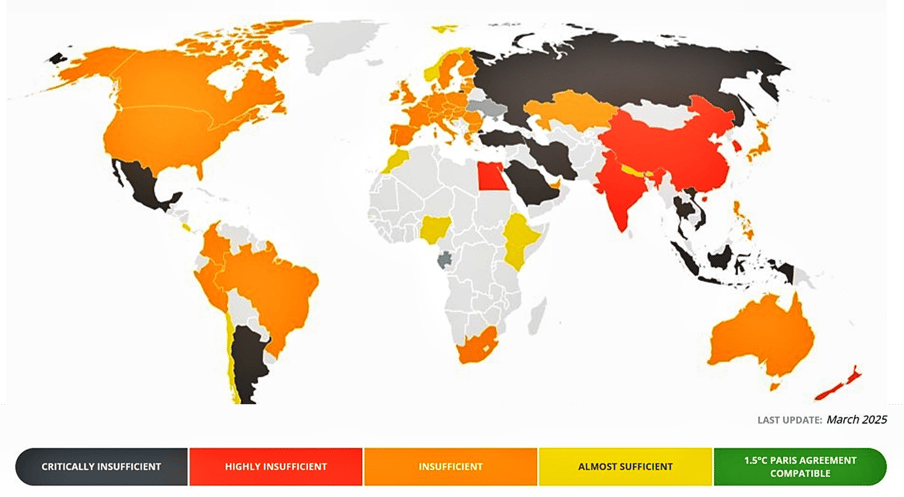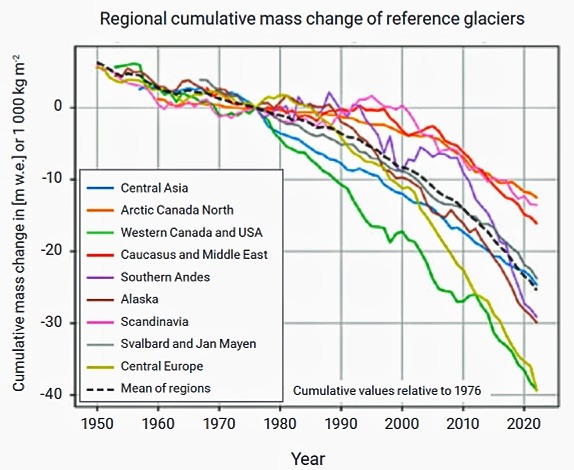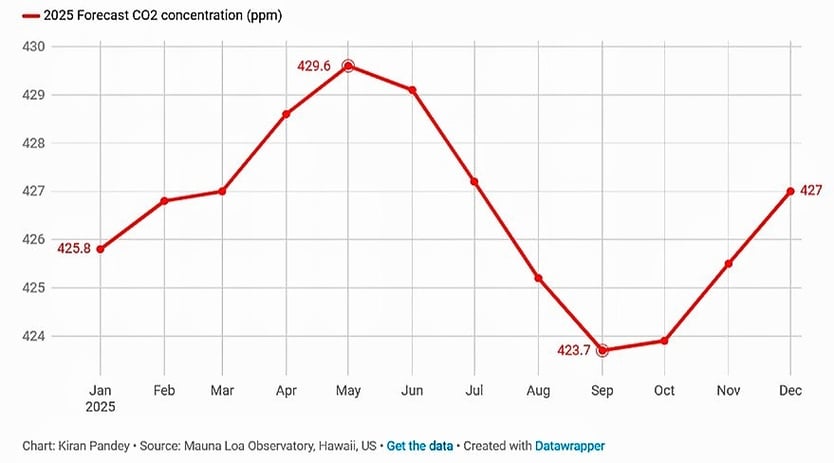

LATEST CLIMATE NEWS
March 2025
Adam Sébire / Climate Visuals


The Climate Action Tracker is an independent scientific project that tracks government climate action and measures it against the globally agreed Paris Agreement aim of "holding warming well below 2°C, and pursuing efforts to limit warming to 1.5°C."
They publish regular updates on 34 countries plus the EU, revealing their progress towards the Paris Agreement aims. The map below shows the latest findings with each country (where evidence is available) graded 'critcally insufficient' to 'Paris compatible'.
Impacts:
A new study on the rate of sea level rise has been published in Nature (March 19). Layers of peat at the bottom of the North Sea were examined which revealed how quickly sea levels rose about 11,000 years ago at the end of the last ice age. At this time, the Earth was warming as fast as it is now.
Scientists have been struggling to accurately predict sea level rise over the course of this century. Their estimates vary between 1 and 4 feet. The new study points to a 3 foot rise as a real possibility.
In 2023, scientists found that along the SE coast of the US and in the Gulf of Mexico, sea levels were rising far faster than the yearly global average, 0.4 inches/yr as opposed to 0.14 inches/yr. Another research paper in 2024 reported that the sea level rise has doubled from 0.8 inches per decade in 1993 to 1.7 inches.
There is no doubt any longer that sea level rise is accelerating. This is no great surprise since all the contributory factors (see Rising Sea Levels) are also accelerating.
Impacts:
On 21st March, the UN published their World Water Development Report 2025. It focuses on the role played by mountains and glaciers in providing water security for billions of people across the planet. Their introduction read as follows
'For billions of people, mountain meltwater is essential for drinking water and sanitation, food and energy security, and the integrity of the environment.
But today, as the world warms, glaciers are melting faster than ever, making the water cycle more unpredictable and extreme. And because of glacial retreat, so floods, droughts, landslides and sea-level rise are intensifying, with devastating consequences for people and nature.'
The Report makes for alarming reading with so many climate trends well established and impossible to reverse. The following chart of cumulative glacier mass lost in various mountain regions across the world summarises a distressing picture which affects increasing numbers of people whose livelihoods are utterly dependent on summer melt from glaciers.




Down to Earth, the environmental news outlet has published a report on global CO2 levels based on recent calculations by the UK Met Office. According to the CO2 measurements from the Mauna Loa Observatory, the annual increase between 2023 and 2024 was the highest ever recorded. But the predictions for 2025 are even worse with a projected CO2 high of 429.6ppm - the highest CO2 concentration for over 2 million years. The graph below shows the predicted level for each month in 2025. If the predictions are correct, CO2 concentrations in March should reach 427ppm. They did on March 5th.
This worst-case scenario, completely ignored by the world's major industrial economies, is the result of record-high fossil fuel emissions, reduced carbon capture by natural sinks such as tropical forests and massive wildfires. All three causes are set to continue this year with fossil fuel emissions increasing year on year until at least 2030, driven by a catastrophic about-turn in US climate policy, mimicked by a number of high-polluting countries around the world. As CO2 concentration climbs ever higher towards 450ppm, so global temperatures will also climb.
If you have read the Prediction Climate Change section, you will know that we are currently following a CO2 concentration trajectory labelled RCP8.5. This puts us on a pathway to +4°C above pre-1900 temperatures by 2100. Human civilisation as it currently exists will not survive that temperature increase. I can put it no blunter than that.
The graph shows predicted CO2 concentrations for each month of 2025. January, February and March predicted values are exactly as predicted.
On March 21st, huge wildfires broke out in the south east of South Korea, engulfing much of North Gyeongsang Province, home to mountain ranges and South Korea's largest concentration of pine forests.
Tens of thousands of people have been displaced with 27 fatalities thus far (March 27th) making this by far the worst fires in South Korea's history.


Around 81,500 acres (33,000 hectares) of land have burned, far surpassing South Korea’s previous worst-ever wildfire, in March 2000, which scorched 59,000 acres (24,000 hectares) of land.
Ben Rich, Lead BBC Weather Presenter, commented:
'The weather rarely causes wildfires on its own, but it can give conditions that help wildfires to take hold and spread. That is exactly what has happened in South Korea. Temperatures several degrees above the seasonal norm have combined with dry ground, strong winds and low humidity to fuel fires that authorities say were ignited by human activity.
Scientists have been carrying out so-called rapid attribution studies to assess what part climate change has played in creating these conditions.
Analysis by Climate Central, suggests that the high temperatures recorded in parts of South Korea over the last week have been made up to five times more likely by global warming.'
The US Environmental Protection Agency (EPA) has cancelled grants totalling $20 billion which the Biden Administration issued to finance clean energy and other climate-friendly projects.
The grants were awarded in April 2024 to a number of environmental organisations tasked with financing thousands of projects aimed at making homes more energy efficient and less polluting.
Earth.org have reported on a list compiled by thinktank InfluenceMap of 36 fossil fuel company giants who together produced more than 20 billion tonnes of carbon dioxide emissions in 2023. Topping the list is Saudi Aramco which accounted for no less than 4.38% of total global CO2 emissions. If Saudi Aramco was a country, it would be the 4th largest CO2 polluter after China, US and India. Second on the list was Coal India. Interestingly, China's cement companies together came 7th in the list, having produced over half of the world's cement in 2023.
Perhaps the most disturbing climate-related event of the month was the construction of a new 8-mile long 4-lane highway through the Brazilian rainforest to ease traffic flow around the city of Belem. Why has this development, which has been talked about for 20 years, suddenly become a priority for the Brazilian government?
The answer - disputed by the government - might involve around 50,000 COP30 delegates scheduled to descend on Belem in November this year. The BBC reported that a Brazilian state infrastructure secretary had listed the new road among 30 projects preparing the city for COP30. The secretary claimed that the people of Belem needed a legacy from the summit meeting. Moreover, the government was keen to serve the COP30 delegates in the best possible way.
I will take the liberty of quoting some remarks made in the public comments section following the BBC's article:
Every year COP manages to outdo itself in the "irony of the year" competition.
You just couldn't make it up. There's obviously a law that's been passed worldwide that makes common sense illegal.
This in one article fully encapsulates the utter madness of times we live in. Where the focus is all about "virtue signalling" versus actually doing something meaningful for the cause you claim to care about.